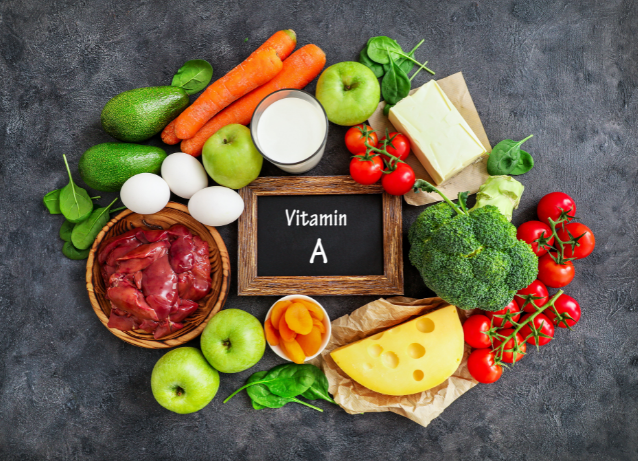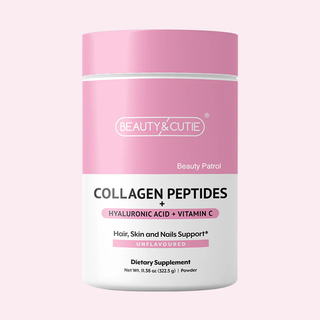This article will discuss the many benefits of Vitamin A rich foods. You know you need a balanced diet to stay healthy. What does that really mean? What you eat determines your overall health, along with exercise, healthy weight, environmental exposures and genetics. One of the greatest things you can do for your health is to eat a variety of foods that give your body what it needs to stay healthy, fight off disease, and keep organ systems running at peak performance. A balanced diet means getting your proteins, fats, carbohydrates and vitamins that your body needs from your meals. These need to be in moderate and balanced amounts to keep your metabolic and cellular functions working properly.
The Science Behind Vitamin A
Vitamin A is used in cell growth and development. Vitamin A is also one of the antioxidant vitamins, which work to help protect the hair, skin, and nails from damaging free radicals. You may have heard Vitamin A referred to with different names. Retinol, beta-carotene, carotenoids are some other names that can be used in describing Vitamin A. There are two main types of Vitamin A that exist in foods. Preformed Vitamin A, which consists of the biological active forms such as retinol, retinal and retinoic acid (collectively known as retinoid). The second type is known as “provitamin A” and a well-known example of this is beta-carotene. On digestion of these foods, your body will convert this form of vitamin A into the retinoid form of (preformed vitamin A).
Preformed Vitamin A is generally found in meats, dairy products and fish. Pro vitamin A are found in plant sources and include for example carrots, sweet potatos, red peppers.
Most of the vitamin A in our body is stored in specific cells in the liver as retinyl palmitate, which is the same compound that we use as the source for vitamin A in our product. When our body requires vitamin A, it binds to a special protein and is transported through the bloodstream to where it is needed.
What food has the most vitamin A?
Here are 20 vitamin A-rich foods:
-
Sweet potato: One medium-sized sweet potato contains 438% of the daily value (DV) of vitamin A.
-
Carrots: One medium-sized carrot provides 204% of the DV of vitamin A.
-
Kale: One cup of cooked kale contains 354% of the DV of vitamin A.
-
Spinach: One cup of cooked spinach provides 377% of the DV of vitamin A.
-
Butternut squash: One cup of cooked butternut squash contains 457% of the DV of vitamin A.
-
Pumpkin: One cup of cooked pumpkin provides 245% of the DV of vitamin A.
-
Broccoli: One cup of cooked broccoli contains 85% of the DV of vitamin A.
-
Liver: One ounce of beef liver contains 150% of the DV of vitamin A.
-
Red bell pepper: One medium-sized red bell pepper provides 93% of the DV of vitamin A.
-
Cod liver oil: One tablespoon of cod liver oil contains 140% of the DV of vitamin A.
-
Cantaloupe: One cup of cantaloupe provides 68% of the DV of vitamin A.
-
Papaya: One cup of papaya contains 29% of the DV of vitamin A.
-
Mango: One cup of mango provides 25% of the DV of vitamin A.
-
Apricot: One apricot contains 4% of the DV of vitamin A.
-
Tomato: One medium-sized tomato provides 20% of the DV of vitamin A.
-
Cheese: One ounce of cheddar cheese contains 6% of the DV of vitamin A.
-
Milk: One cup of whole milk contains 4% of the DV of vitamin A.
-
Eggs: One large egg provides 6% of the DV of vitamin A.
-
Tuna: One 3-ounce serving of tuna contains 6% of the DV of vitamin A.
-
Beef: One 3-ounce serving of beef provides 2% of the DV of vitamin A.
Vitamin A deficiency is considered rare in the United States. Certain populations are at a greater risk of not receiving enough Vitamin A. Girls, African American children, Cystic-Fibrosis patients, restricted diets and any gastrointestinal absorption issues have all been identified as at risk for receiving lower amounts of Vitamin A in their everyday diets.
Food Preparation
The preparation method of various Vitamin A rich foods has come under scrutiny in the past. Is raw better than boiling? What happens if you overcook your roasted broccoli because that's the only way you will eat broccoli? The different cooking methods can make the different forms of Vitamin A convert into different related chemical structures, but that is not always a bad thing. Cooking a tomato can release greater amounts of Vitamin A, but the same is not true for carrots. In general, cooking may cause changes to vitamin content but it depends on vegetables and the cooking process.
Useful tip: For maximum absorption while eating Vitamin A you need a small amount of fat to be ingested at the same time. This can b
Vitamin A is an essential nutrient that plays a crucial role in the development and maintenance of a healthy body. It's particularly important for pregnant women and infants, as it helps to support the growth and development of their bodies. Fortunately, there are many vitamin A rich foods that are easy to incorporate into your diet. In this article, we'll explore the benefits of vitamin A and highlight some of the top foods that are high in this important nutrient.
What is Vitamin A?
Vitamin A is a group of fat-soluble compounds that include retinol, retinal, and retinoic acid. It's an essential nutrient that cannot be produced by the body, so it must be obtained through the diet. Vitamin A is necessary for healthy vision, immune function, and skin health. It also plays a role in the growth and development of bones, teeth, and tissues.
Pregnant women and infants have specific needs for vitamin A. During pregnancy, vitamin A helps to support the growth and development of the fetus, particularly the development of the eyes, ears, and limbs. In infants and young children, vitamin A is essential for supporting growth and development, as well as maintaining a healthy immune system. However, it's important to note that excessive intake of vitamin A can be harmful, so it's important to consume it in moderation and under the guidance of a healthcare professional.
What Are The Benefits Of Vitamin A?
There are many benefits of including vitamin A-rich foods in your diet. As mentioned earlier, it plays a crucial role in eye health, helping to prevent night blindness and other eye disorders. It's also important for maintaining healthy skin, as it helps to promote cell growth and repair. Vitamin A is also known to support a healthy immune system, helping to fight off infections and diseases.
Another benefit of vitamin A is its role in bone health. It helps to support the growth and development of bones, making it an important nutrient for growing children and teens. It also helps to maintain bone density in adults, reducing the risk of osteoporosis and other bone disorders.
Overall, vitamin A is an essential nutrient that plays a vital role in the development and maintenance of a healthy body. Pregnant women and parents of infants should ensure that they are consuming an adequate amount of vitamin A-rich foods, but should also be mindful of not consuming too much. As always, it's important to consult with a healthcare professional to determine the appropriate intake for you and your family.
What Foods Are High In Vitamin A?
Here are some foods that are high in vitamin A:
- Sweet potatoes - a great source of beta-carotene, which the body converts to vitamin A.
- Carrots - another source of beta-carotene, which is known to support eye health.
- Spinach - rich in vitamin A and other important nutrients like iron and calcium.
- Kale - a nutrient-dense leafy green that is high in vitamin A.
- Butternut squash - another good source of beta-carotene.
- Red bell peppers - high in vitamin A and other antioxidants.
- Mangoes - a sweet fruit that is also a good source of vitamin A.
- Cantaloupe - a refreshing fruit that is known for its high vitamin A content.
- Apricots - a juicy fruit that is packed with vitamin A and other important nutrients.
- Papayas - a tropical fruit that is rich in vitamin A and digestive enzymes.
- Liver - a great source of preformed vitamin A, which the body can use immediately.
- Cod liver oil - a supplement that is high in vitamin A and omega-3 fatty acids.
- Eggs - a good source of vitamin A and other important nutrients like protein and choline.
- Butter - a dairy product that is a natural source of vitamin A.
- Cheese - a dairy product that contains small amounts of vitamin A.
- Fortified milk - milk that has been enriched with vitamin A and other nutrients.
- Broccoli - cruciferous vegetables that are a good source of vitamin A and other important nutrients like vitamin C and folate.
- Lettuce - a low-calorie leafy green that is high in vitamin A, as well as other important nutrients like vitamin K and folate.
- Chard - a leafy green that is high in vitamin A, as well as other important nutrients like iron and magnesium.
- Yogurt - a dairy product that is often fortified with vitamin A and also contains probiotics for gut health.
Overall, vitamin A plays a vital role in supporting the development and maintenance of a healthy body. Vitamin A can easily be incorporated into any diet with plant sources and animal products. By incorporating a variety of vitamin A-rich foods into your diet, you can help ensure that you and your family are getting the nutrients you need to thrive.
What Fruits Are High In Vitamin A?
Here are some fruits that are high in vitamin A:
- Mangoes - a sweet fruit that is also a good source of vitamin A.
- Cantaloupe - a refreshing fruit that is known for its high vitamin A content.
- Apricots - a juicy fruit that is packed with vitamin A and other important nutrients.
- Papayas - a tropical fruit that is rich in vitamin A and digestive enzymes.
- Oranges - a citrus fruit that contains small amounts of vitamin A.
- Kiwis - a small fruit that is high in vitamin C and also contains vitamin A.
- Peaches - a juicy fruit that is a good source of vitamin A and other important nutrients like vitamin C and potassium.
- Watermelon - a refreshing fruit that contains small amounts of vitamin A.
- Tomatoes - a fruit that is high in vitamin C and also contains small amounts of vitamin A.
- Grapefruits - a citrus fruit that is a good source of vitamin A and other important nutrients like vitamin C and potassium.
What Meats Are High In Vitamin A?
Meats that are high in vitamin A include:
- Beef Liver - organ meats are a rich source of vitamin A, vitamin D, iron, and other important nutrients.
- Beef - red meat that contains small amounts of vitamin A.
- Chicken - a lean protein that contains small amounts of vitamin A.
- Turkey - a lean protein that contains small amounts of vitamin A.
- Pork - a meat that contains small amounts of vitamin A.
- Lamb - a red meat that contains small amounts of vitamin A.
What Seafoods Are High In Vitamin A?
Seafood that are high in vitamin A include:
- Salmon - an oily fish that is a good source of vitamin A and omega-3 fatty acids.
- Tuna - a popular fish that contains small amounts of vitamin A.
- Mackerel - a fatty fish that is high in vitamin A and omega-3 fatty acids.
- Cod - a white fish that contains small amounts of vitamin A.
- Shrimp - a shellfish that contains small amounts of vitamin A.
- Crab - a shellfish that contains small amounts of vitamin A.
- Oysters - a shellfish that is a good source of vitamin A and other important nutrients like zinc.
What Is The Best Way To Consume Vitamin A?
Consuming a well-balanced diet that includes vitamin A-rich foods is the best way to get this essential nutrient. While supplements are available, they should only be taken under the guidance of a healthcare professional, as excessive intake of vitamin A can be harmful.
It's also important to note that vitamin A is a fat-soluble vitamin, meaning it is absorbed better when consumed with dietary fat. So, including healthy fats in your diet, such as nuts, seeds, avocado, and olive oil, can help with vitamin A absorption.
Are Any Nuts or Seeds High In Vitamin A?
While nuts and seeds are generally considered to be a good source of vitamins and minerals, they are not typically high in Vitamin A. This essential vitamin is more commonly found in animal products such as liver, eggs, and dairy products, as well as in colorful fruits and vegetables like sweet potatoes, carrots, and leafy greens.
That being said, some nuts and seeds do contain small amounts of Vitamin A. For example, one ounce of sunflower seeds contains about 10% of the daily recommended value of Vitamin A, while an ounce of almonds provides roughly 2% of this nutrient. However, it's important to note that these amounts are relatively small compared to other food sources, so relying solely on nuts and seeds as a source of Vitamin A is not recommended.
Conclusion
In conclusion, vitamin A is an essential nutrient that plays many important roles in our bodies, especially during pregnancy and infancy. Consuming a well-balanced diet that includes a variety of vitamin A-rich foods is the best way to get this nutrient. Seafood such as salmon, tuna, mackerel, and oysters are excellent sources of vitamin A, as are colorful fruits and vegetables like sweet potatoes, carrots, and leafy greens. While nuts and seeds may contain small amounts of vitamin A, they are not typically considered to be high in this nutrient. Remember to always consult with a healthcare professional before taking any supplements, as excessive intake of vitamin A can be harmful.
Final Thoughts
Beauty and Cutie believes that confidence comes from feeling comfortable in your own skin. Our advanced collagen powders provide the nutrients your hair, skin, and nails need to thrive. By encouraging cell growth, our formula helps you shine from the inside out. Let your beauty radiate with Beauty and Cutie!
- https://www.hsph.harvard.edu/nutritionsource/vitamin-a/
- https://www.healthline.com/nutrition/foods/sweet-potatoes
- https://nutritionstripped.com/food-index/red-bell-peppers/
- https://www.webmd.com/diet/health-benefits-apricots
- https://www.healthline.com/nutrition/salmon-nutrition-and-health-benefits
- https://www.verywellfit.com/mackerel-nutrition-facts-and-health-benefits-5074868
*These statements have not been evaluated by the Food and Drug Administration. This product is not intended to diagnose, treat, cure or prevent any diseases.


